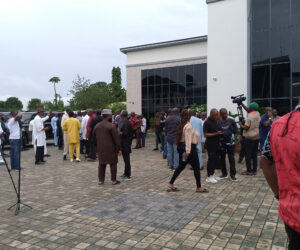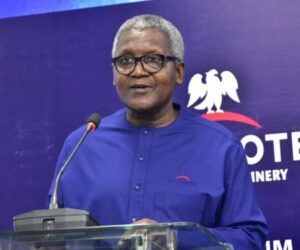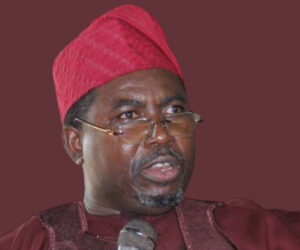
Energy expert, Kelvin Emmanuel, has warned that attempts by oil workers’ unions to disrupt operations at the Dangote Refinery amount to a threat to Nigeria’s national security.
Speaking in an interview with ARISE News on Saturday, Emmanuel said:
“It was shocking when I saw the statement attributed to PENGASSAN. The reason why it is shocking is because usually, when I’m in this corner, I like to look at the law. I like the situation within the context of the law. There is the Trade Union Act and then there is the Trade Disputes Act that governs and guides the operations of trade unions in Nigeria.”
Citing Sections 9 of the Trade Union Act and Sections 41(1a) and (1b) of the Trade Disputes Act, he explained that energy supply is classified as an essential service, and as such, disruption cannot be carried out without due process.
“In matters of essential services, the Federal Government of Nigeria reserves the right to actually intervene and supersede every other laid-down process if there is going to be a disruption of energy services without recourse to a 15-day notice that should be given by any striking workers for picketing,” he stated.
He added that the law prescribes clear procedures for trade disputes:
“If a dispute arises, the Minister of Labour is supposed to get the notice within seven days, and if she is unable to resolve it within seven days, she is supposed to appoint a conciliatory mediator. That mediator is supposed to report within 14 days. If conciliation fails, it proceeds to the Industrial Arbitration Panel (IAP). If it fails at the IAP, it is referred to the National Industrial Court.
It is only when the National Industrial Court has adjudicated over the matter that the union has the legal authority to issue that seven-day notice before it strikes.”
He condemned the actions of the Nigeria Union of Petroleum and Natural Gas Workers (NUPENG), accusing the union of unlawfully blocking Dangote’s refinery.
“NUPENG went and took trucks and blocked the entrance to a private business where Dangote pledged his shares in Dangote Smelters as collateral to build the refinery that NNPC failed to do for 13 years. Did they follow this process? No. Are they threatening Nigeria’s national security? Yes. The question is, what is the DSS and NIA doing about it? Because any threat to essential services like energy supply and security is a threat to Nigeria’s national security.”
On claims that Dangote was unfairly restructuring, Emmanuel defended the company’s rights.
“Even Mele Kyari, the GCEO of NNPC, has had PENGASSAN threatening him for reorganising NNPC. Dangote is reorganising his own company. He borrowed money to build the refinery, and through very good management has reduced his debt to $3.8 billion. He is a private businessman. He has a right to hire and fire, and he has followed the Trade Union Act, Sections 9(1) and (2), as well as ILO Conventions 87 and 97 on collective bargaining and the freedom of joining unions.
“PENGASSAN and NUPENG cannot compel employees of his company to join the union if they decide not to. This desperation by the unions is fishy and shows clearly that they are problems for marketers who realise the market is transitioning to a new era of refining.”
Emmanuel also dismissed fears that Dangote’s expansion into distribution was anti-competitive.
“The CNG trucks he brought into Nigeria — 4,000 in the first batch — are energy-compliant, emit less carbon, are efficient, and save about 40 per cent of transportation costs. Each truck has six workers, meaning 24,000 new jobs are created, paying three to four times what PENGASSAN and NUPENG pay their drivers. So I don’t understand the argument of PENGASSAN. It is completely out of place.”
He stressed that disrupting Dangote Refinery’s operations would have severe consequences for the economy.
“Dangote produces 44 million litres of PMS daily, higher than Nigeria’s actual consumption. It also produces 26 million litres of diesel and 14 million litres of Jet A1. In the last three weeks, Dangote exported refined petroleum products to the United States — the first time in Nigeria’s history.
“If supply is stopped, he will have to reorganise and buy crude from the foreign market, spending $9 million every month on shipping alone. He already pays a premium of $3.50 per barrel to buy Nigerian crude through third-party traders. The FX he earns from exports is what he uses to buy crude back into Nigeria. After 57 years of an oil industry, it is an anomaly that in 2025 Dangote is still importing 10 million barrels of crude monthly while exporting refined products.”
He lamented government silence on the matter.
“I don’t know what the president is doing, or why the ministers of finance and petroleum have not made any comment. This is a threat to national security.”
Tracing the history of Nigeria’s failed refineries, Emmanuel said past resistance to privatisation had wasted billions of dollars.
“In 2006, the Federal Executive Council approved the privatisation of refineries. Kaduna was sold to CNPC for $100 million, but government reversed the sale. Port Harcourt and Warri were sold to Blue Star Consortium, and again reversed after unions pressured late President Umaru Musa Yar’Adua. Since then, $18 billion has been wasted on maintenance and none of the refineries work.
“Dangote spent 10 years building his refinery, pledged shares as collateral, and has reduced debt from $15 billion to $3.8 billion. Dangote Refinery is a national asset that should be commended. The president should designate it as critical national infrastructure, because in Nigeria’s history, nobody has had the courage to break with the norm and invest in backward integration for refining,” he concluded.
Boluwatife Enome
Follow us on:








